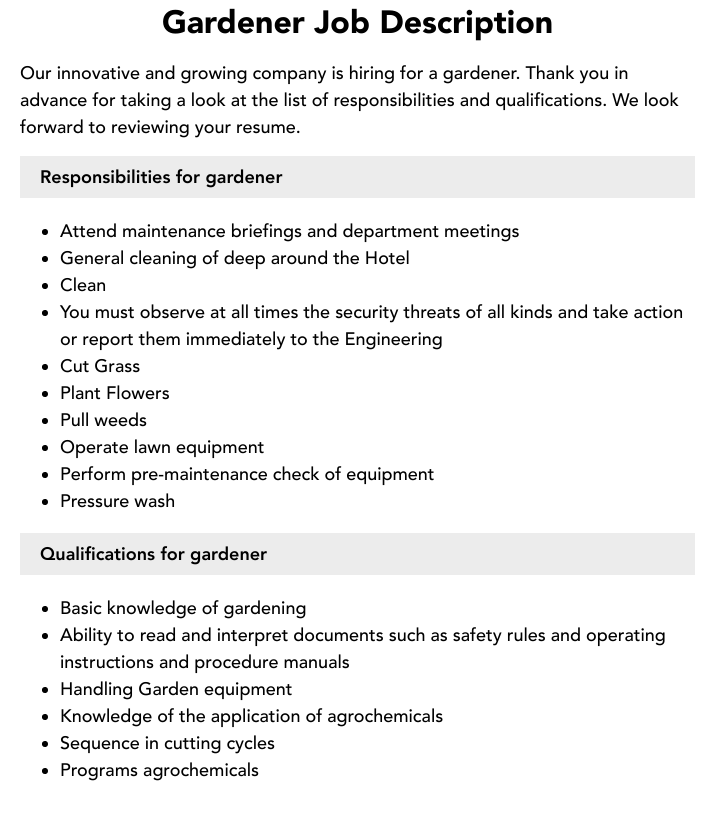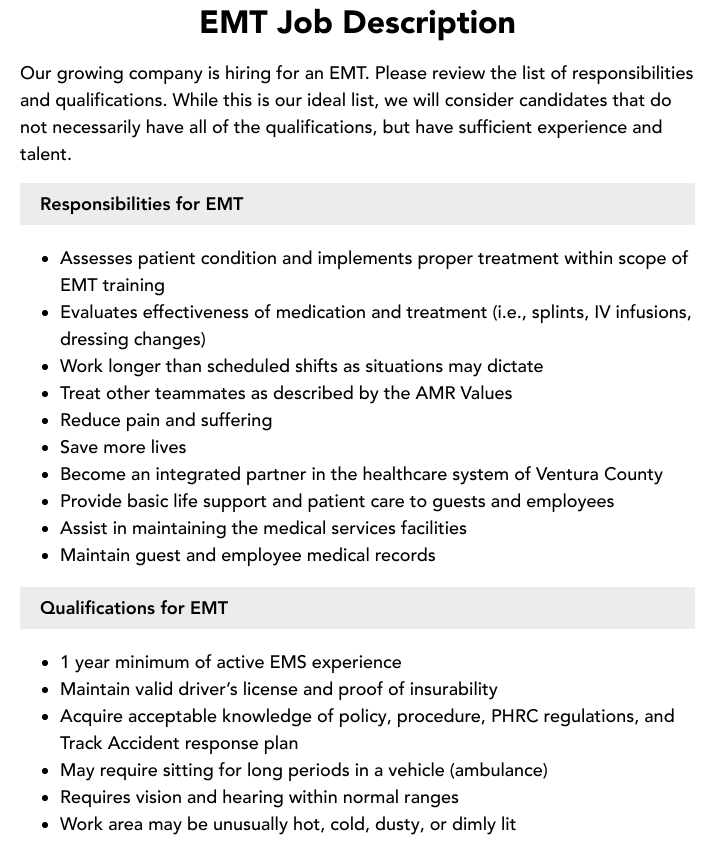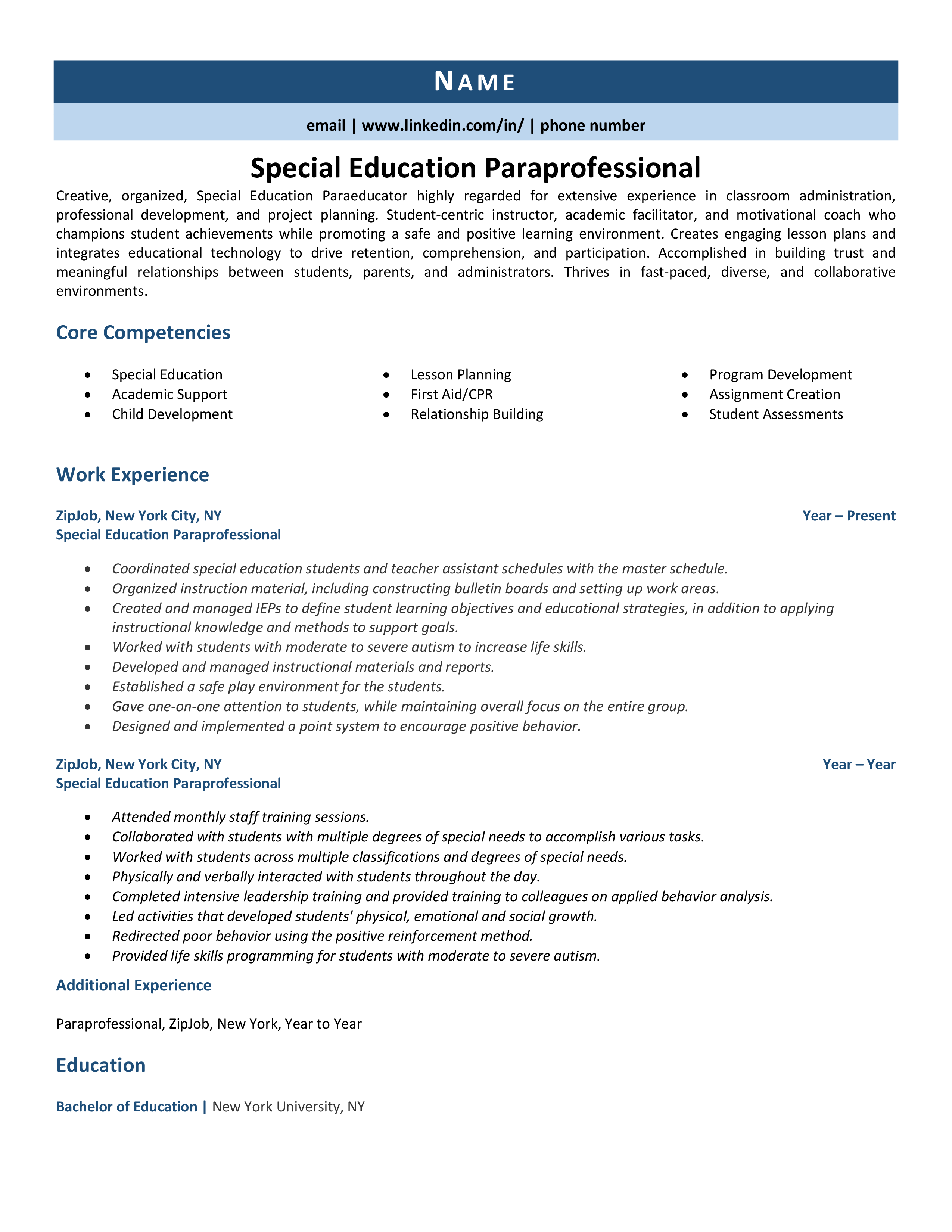
A gardener job description outlines the duties, responsibilities, and qualifications required for a gardener position. These professionals are responsible for maintaining and caring for plants, gardens, and landscapes. They may work in various settings, including private homes, public gardens, parks, and greenhouses.
Gardeners typically perform tasks such as planting, watering, weeding, fertilizing, pruning, and pest control. They may also be involved in designing and installing new gardens or landscapes. Some gardeners specialize in a particular type of gardening, such as organic gardening, water gardening, or container gardening.
To be successful in this role, gardeners should have a strong knowledge of horticulture and plant care. They should also be physically fit and able to work outdoors in all types of weather conditions. Gardeners should also be creative and have a good eye for design.
1. Plant care
Plant care is a crucial aspect of a gardener’s job description. Gardeners must have a strong understanding of horticulture and plant care to maintain healthy and beautiful gardens and landscapes. They should be able to identify and treat common plant pests and diseases, as well as provide proper watering, fertilization, and pruning.
For example, a gardener may need to know how to identify and treat powdery mildew on roses or how to prevent aphids from damaging vegetable plants. Gardeners may also need to be able to diagnose and treat more serious plant diseases, such as verticillium wilt or Dutch elm disease.
By having a strong knowledge of plant care, gardeners can help to keep plants healthy and thriving. This not only improves the appearance of gardens and landscapes but also helps to protect plants from pests and diseases.
2. Physical Fitness
Physical fitness is an essential requirement for gardeners. The job requires a lot of physical activity, including lifting heavy objects, digging, and weeding. Gardeners must also be able to work in all types of weather conditions, from hot and humid to cold and wet.
- Strength: Gardeners need to be strong enough to lift heavy objects, such as bags of soil or mulch. They may also need to move heavy equipment, such as lawnmowers and trimmers.
- Endurance: Gardeners need to have good endurance to be able to work for long periods of time. They may need to stand or walk for hours at a time, and they may need to work in all types of weather conditions.
- Flexibility: Gardeners need to be flexible to be able to reach and work in awkward positions. They may need to bend, stoop, and kneel to plant, weed, and prune plants.
- Balance: Gardeners need to have good balance to be able to work safely on ladders and other elevated surfaces. They may also need to be able to walk on uneven terrain.
Gardeners who are physically fit are more likely to be able to perform their job duties safely and efficiently. They are also less likely to get injured on the job.
3. Creativity
Creativity is an essential aspect of a gardener job description. Gardeners are often responsible for designing and installing new gardens or landscapes. This requires them to have a strong understanding of design principles, as well as a good eye for color and texture. Gardeners must also be able to think creatively to solve problems and come up with new ideas.
For example, a gardener may be asked to design a new garden for a client. The gardener would need to take into account the client’s needs and preferences, as well as the existing landscape. The gardener would then need to come up with a design that is both beautiful and functional.
Creativity is also important for gardeners who are responsible for maintaining existing gardens and landscapes. Gardeners may need to come up with new ways to plant and arrange plants, or they may need to find creative solutions to problems such as pests or diseases.
By being creative, gardeners can help to create beautiful and inspiring gardens and landscapes. They can also help to solve problems and come up with new ideas to improve the appearance and functionality of outdoor spaces.
4. Communication
Communication is an essential aspect of a gardener job description. Gardeners often need to communicate with clients or other staff members to discuss plant care or design ideas. This may involve providing advice on plant selection, care, and maintenance, or discussing design ideas for new gardens or landscapes.
- Providing advice to clients: Gardeners may need to provide advice to clients on plant selection, care, and maintenance. This may involve answering questions about plant hardiness, watering requirements, and pest control. Gardeners may also need to provide advice on garden design, such as how to choose the right plants for a particular space or how to create a cohesive look.
- Collaborating with other staff members: Gardeners may need to collaborate with other staff members, such as landscape architects or contractors, to discuss design ideas or to coordinate the installation of new gardens or landscapes. Gardeners may also need to communicate with other staff members to discuss plant care or maintenance issues.
- Building relationships with clients: Gardeners may need to build relationships with clients to ensure that their needs are met. This may involve communicating regularly with clients to discuss plant care or design ideas, or to provide updates on the progress of a project.
- Resolving conflicts: Gardeners may need to resolve conflicts between clients or staff members. This may involve mediating disputes or finding compromises that satisfy all parties involved.
By having strong communication skills, gardeners can build relationships with clients, collaborate effectively with other staff members, and resolve conflicts. This helps to ensure that gardens and landscapes are well-maintained and that clients are satisfied with the services provided.
5. Customer service
Excellent customer service is an essential aspect of a gardener’s job description. Gardeners often interact with clients to provide advice on plant care and garden design, and they may also be responsible for answering questions about products and services. As a result, gardeners must be able to communicate effectively, build relationships with clients, and resolve any issues or concerns that may arise.
- Providing personalized advice: Gardeners should be able to provide personalized advice to clients based on their individual needs and preferences. This may involve helping clients to choose the right plants for their gardens, providing advice on plant care and maintenance, or offering suggestions for garden design.
- Building relationships with clients: Gardeners should be able to build strong relationships with clients by providing excellent customer service. This involves being friendly, helpful, and responsive to clients’ needs. Gardeners should also be able to communicate effectively with clients and build trust.
- Resolving issues and complaints: Gardeners may need to resolve issues or complaints from clients. This may involve dealing with problems such as damaged plants, incorrect orders, or billing errors. Gardeners should be able to resolve these issues quickly and efficiently while maintaining a positive relationship with the client.
By providing excellent customer service, gardeners can build strong relationships with clients and ensure that they are satisfied with the services provided. This can lead to repeat business and positive word-of-mouth, which can help to grow the business.
FAQs on “gardener job description”
This section provides answers to frequently asked questions about gardener job descriptions. These Q&A pairs address common concerns or misconceptions, shedding light on various aspects of the role and its requirements.
Question 1: What are the essential duties and responsibilities of a gardener?
Gardeners are responsible for maintaining and caring for plants, gardens, and landscapes. Their duties may include planting, watering, weeding, fertilizing, pruning, and pest control. They may also be involved in designing and installing new gardens or landscapes.
Question 2: What qualifications are typically required for a gardener position?
Gardeners typically need a high school diploma or equivalent and experience working with plants and gardens. Some employers may prefer candidates with a degree in horticulture or a related field. Gardeners should also have strong physical fitness, as the job requires a lot of physical activity.
Question 3: What are the different types of gardening jobs?
There are many different types of gardening jobs, including landscape gardener, groundskeeper, arborist, greenhouse technician, and floral designer. Each type of job has its own specific duties and responsibilities.
Question 4: What is the job outlook for gardeners?
The job outlook for gardeners is expected to be good over the next few years. As the population grows, so does the demand for gardeners to maintain and care for gardens and landscapes.
Question 5: What are the benefits of working as a gardener?
Working as a gardener offers many benefits, including working outdoors, being physically active, and working with plants. Gardeners also have the opportunity to make a positive impact on the environment.
Question 6: What are the challenges of working as a gardener?
Working as a gardener can be challenging at times. The job requires physical labor and can be demanding in hot or cold weather. Gardeners may also need to work with pesticides and other chemicals.
Summary:
A gardener job description outlines the essential duties and responsibilities of a gardener. Gardeners play an important role in maintaining the beauty and health of our gardens and landscapes. They are responsible for providing us with fresh produce, beautiful flowers, and tranquil outdoor spaces.
Transition to the next article section:
For more information on gardener job descriptions, please refer to the following resources:
- O*NET Online
- Bureau of Labor Statistics
- Gardeners.com
Tips for Writing a Gardener Job Description
A well-written gardener job description is essential for attracting qualified candidates and ensuring that your new hire is a good fit for the position. Here are a few tips to help you write a great gardener job description:
Tip 1: Start with a clear and concise job title.
The job title should accurately reflect the duties and responsibilities of the position. For example, “Gardener” or “Landscape Gardener.”
Tip 2: Include a brief overview of the company and the position.
This will help candidates understand the company culture and the role of the gardener within the organization.
Tip 3: List the essential duties and responsibilities of the position.
Be specific and detailed, but avoid using jargon or technical terms that candidates may not be familiar with.
Tip 4: Include the qualifications and experience required for the position.
This may include education, experience, skills, and certifications.
Tip 5: Describe the work environment and any physical requirements of the position.
This will help candidates understand what to expect on the job.
Tip 6: List the benefits of working for the company.
This may include salary, benefits, and opportunities for advancement.
Tip 7: Proofread your job description carefully before posting it.
Make sure there are no errors in grammar or spelling.
Summary:
By following these tips, you can write a gardener job description that will attract qualified candidates and help you find the right person for the job.
Transition to the article’s conclusion:
For more information on writing a gardener job description, please refer to the following resources:
- The Balance Careers
- Indeed
- Monster



